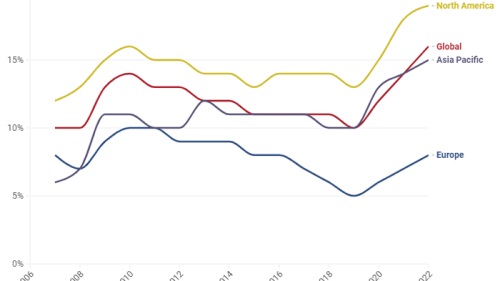Although at odds with the “developing political momentum,” continued federal efforts to jumpstart economic growth through consumer spending initiatives and aid to state and local governments represent the most likely means of creating more jobs and expediting the economic recovery, according to Laura D’Andrea Tyson, S.K. and Angela Chan, professor of global management, Haas School of Business at the University of California Berkeley.
D’Andrea Tyson, a member of President Obama’s Economic Recovery Advisory Board, discussed efforts to boost the recovery’s slow pace during ULI’s 2010 Fall Meeting in Washington. She outlined three areas of focus for the board: 1) the jobs shortage; 2) the nation’s high deficit; and 3) the need to find a sustainable engine for long-term economic growth.
According to D’Andrea Tyson, given the severity of the recession and the resulting excess capacity in most businesses, slow job growth can be expected for some time. Even if the pace were to rise to and remain at four times the level reached in September, “it would still take four years” to reach the jobs level of the economic boom, she noted.
The federal government’s two main forms of assistance – monetary policy and fiscal policy – are having limited success, D’Andrea Tyson explained. While the Federal Reserve Board has implemented a monetary policy to keep interest rates low, many consumers – through job losses, the housing crash, or both – are not financially able to take advantage of low-cost financing, and those who are in a position to borrow or spend are unwilling to do so.
In terms of fiscal policy, the Obama Administration’s stimulus spending represents an “investment in America’s future” by targeting areas critical to America’s global competitiveness – infrastructure, education and research, D’ Andrea Tyson said.
- On infrastructure: “Infrastructure is underfunded…There are many opportunities for public-private partnerships, for instance to support light rail and energy efficiency programs.”
- On education: “Employment opportunities in the twenty-first century demand a college education.” In addition to investing in a superior educational experience for those not yet in the workforce, the recession has created a need for an investment in retraining opportunities for those who have lost their jobs.
- On research: “The U.S. needs to maintain its excellence in the area of research....Energy-efficiency and sustainability” represent very promising areas for research investment.
The catch on additional stimulus spending: concerns over the U.S. deficit and growing political sentiment against more initiatives.
However, with private sector growth still limping, drastically scaling back federal aid to cut the deficit will backfire, D’Andrea Tyson cautioned. “The U.S. government has time to get this right…It is wrong to try to do deficit reduction too fast,” she said. The current situation – in which no major economic growth engine has been identified to replace household consumption – represents “one of the few times in history when the private sector has had trouble righting itself…We need to have a conversation about spending priorities and tax reform that includes the gains the government can get from greater efficiencies, from doing more with the private sector.”
D’Andrea Tyson suggested a multi-year deficit reduction package that would “send a message” to other countries that the U.S. is committed to solving its debt problem over time, by enacting policies that would take affect gradually as the economy recovers.




